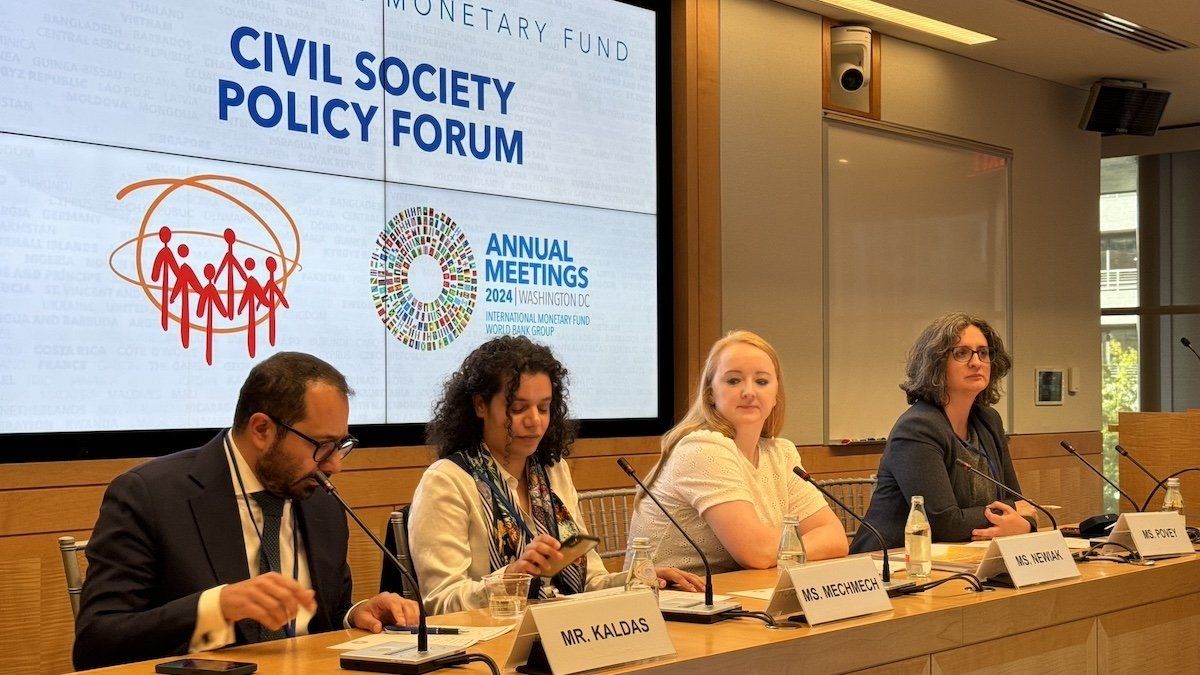October 24, 2024
When a country hits rock bottom financially, the International Monetary Fund is meant to step in with funds to stabilize the economy without damaging its society — or the gender gap. But studies show that these programs often push women out of work at a disproportionate rate to men as the economy contracts.
Alongside this week’s World Bank-IMF Annual Meetings in Washington, DC, the IMF held a policy forum on Tuesday to discuss a new tool called Gender Impact Assessments, which are designed to help build more equitable programs — and protect some of the world’s most vulnerable women.
How do IMF programs hurt women’s opportunities? In any intervention, the IMF has to consider political practicalities in its policy recommendations. All too often, said Farah Al Shami, program director for social protection at the Arab Reform Initiative, “Austerity is politically easier than implementing tax reform.” Citing examples of governments in the Middle East and North Africa, which already spend proportionally less than peer countries on social services and safety nets and have higher female unemployment, she explained that austerity measures push more women than men out of the workforce as the economy contracts, while also reducing the benefits they need. Even more politically palatable ways to raise revenue, like value-added taxation, can disproportionately burden poor women due to their regressive nature.
Why are women forgotten? Tara Povey, the gender equality and macroeconomics project lead at the Bretton Woods Project, said the approach to gender has been too “scattershot” and often falls down the priority list in negotiations. The IMF’s Gender and Inclusion Deputy Unit Chief Monique Newiak, meanwhile, said that even when gender considerations are taken into account, too much of the focus is placed on metrics like labor force participation and not enough on social aspects like child marriage and gender-based violence.
How could Gender Impact Assessments help? By reorganizing the program development process to include key questions about women — including whether policies could force more unpaid family labor on women, monopolize women’s time, or lead to more hiring discrimination — the IMF can begin tailoring more inclusive programs. Rather than suffering social setbacks, the Fund could ensure that women are at the very least not harmed, and ideally set up for greater success in a recovered economy.
More For You
Most Popular
Think you know what's going on around the world? Here's your chance to prove it.
PA via Reuters Ukraine's Vladyslav Heraskevych, with his helmet, which features pictures of people killed in the war with Russia. Heraskevych was ruled out of the Men's Skeleton event by the International Olympic Committee just over an hour before competition began, pictured at the Cortina Sliding Centre, on day six of the Milano Cortina 2026 Winter Olympics, Italy. Picture date: Thursday February 12, 2026.
20: The number of fallen Ukrainian athletes and coaches depicted on a Ukrainian skeleton racer’s helmet at the Winter Olympics, which prompted the International Olympic Committee (IOC) to disqualify him on Thursday.
Russian President Vladimir Putin attends his annual end-of-year press conference and phone-in in Moscow, Russia December 19, 2025.
Sputnik/Alexander Kazakov/Pool via REUTERS
The Russian government has begun blocking the popular messaging apps WhatsApp and Telegram in a sweeping crackdown aimed at forcing Russians to use a state-backed alternative called MAX, which critics say would enable censorship and surveillance.
© 2025 GZERO Media. All Rights Reserved | A Eurasia Group media company.
